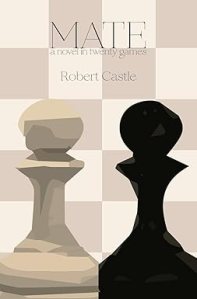Synopsis:
MATE: a novel in twenty games deals with marriage as a chess game. What distinguishes MATE from other stories and novels about the life and death of a relationship is its radical correlation of the actions of a husband and wife to chess moves. The logic of the novel suggests: chess is war reduced to a game; marriage is chess; marriage is war. That is the tragedy—marriage, as a human institution and human desire, is innately tragic. In marriage, one or the other partner feel obliged to annihilate the other in a struggle for…what? This is the central question and riddle of MATE.
Favorite Lines:
“Psychological brutality alone would have satisfied the patrons of the Roman Colosseum.”
“This is tragedy of the modern game, the games cannot avoid desperate attempts to defeat one’s opponent.”
My Opinion:
I received a copy of this book from the author in exchange for my honest opinion.
MATE: A Novel in Twenty Games imagines marriage as a grand-master tournament, complete with opening gambits, trash-talking color commentary, and a running scoreboard that rewards the first spouse to notch six wins. Robert Castle’s conceit lands fast: every domestic flare-up—whether it’s bedtime negotiations or political chatter over lamb chops—gets diagrammed like a tactical skirmish. The result is part sports broadcast, part relationship post-mortem, and entirely compulsive to read.
Most chapters replay a single “game.” Castle’s unseen narrator calls the moves with gleeful precision, pausing to highlight blunders and propose sharper sidelines the players never see. A simple grocery-store run, for instance, spirals into feints, sacrifices, and counter-punches that would impress a blitz champion. The play-by-play can be savage, but its real charm is how it exposes tiny hurts we all recognize—the sigh before an argument, the silent tally of old grievances—without ever dropping the tournament mask.
Beneath the quick wit sits a bleak observation: perfectly played matches end in stalemate, and no clever tactic erases the cost of constant competition. Scores swing wildly—one chapter leaves Pillsbury a single victory from clinching the match—yet triumph feels hollow when the commentary reminds us another round always looms. Class anxiety, gender scripts, and ‘90s pop politics all take turns on the board, their influence measured in incremental positional gains rather than sweeping mates.
If there’s a hurdle, it’s overload. Castle peppers every game with alternative lines and psychological footnotes; the barrage can feel like reading an annotated grand-master classic without diagrams. Still, that density is the punchline: marriage, he suggests, is endless analysis paralysis, where the move you regret is always the one you just made.
Summary:
Overall, sharp, exhausting, and wickedly funny, MATE argues that when love turns into a tournament, the best most of us can hope for is a well-fought draw—and maybe a laugh at the post-game press conference. Happy reading!
Check out MATE: A Novel in Twenty Games here!
